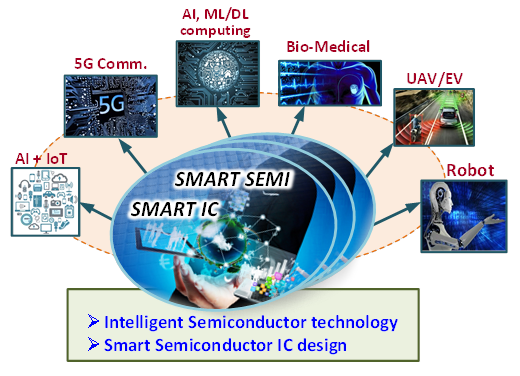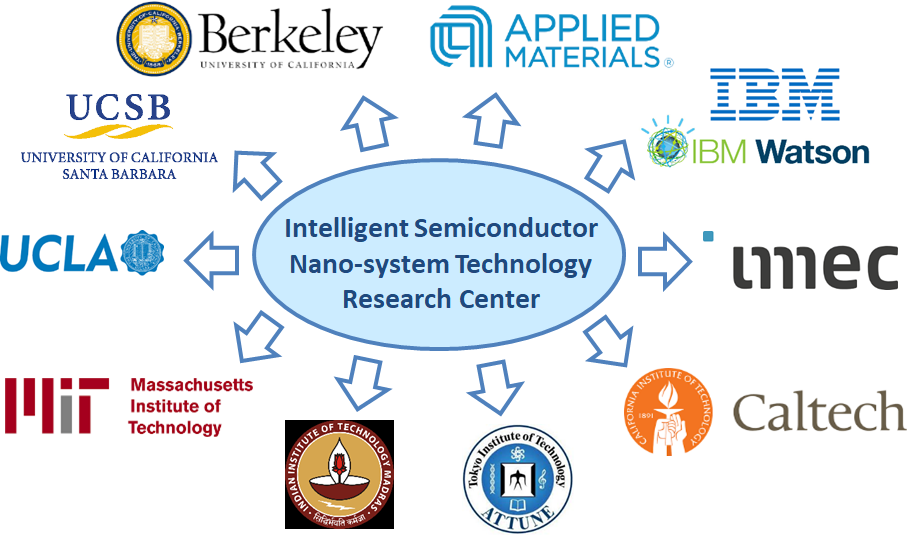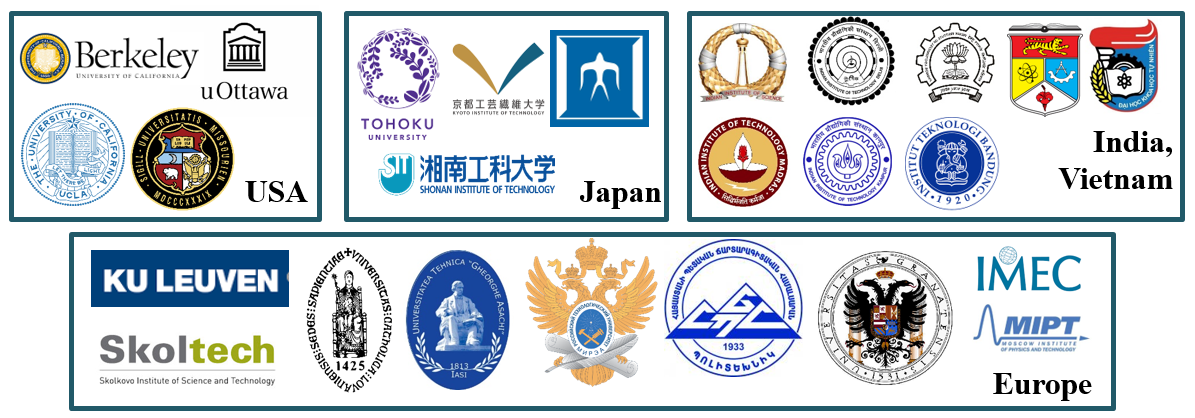Direction of Academic Research and Development
The semiconductor industry plays a key role in the development of global technology. Whether it is the various electronic components and sensors we use today, or the smart phones, tablets and computers that are used by people, the semiconductor industry makes our lives more progressive. In addition, 5G mobile communication, intelligent robots, artificial intelligence (AI) computing and deep learning technology are also revolutionary for the future development on the basis of semiconductor wafers. The International College of Semiconductor Technology (ICST), NCTU, is positioned as an industry-oriented internationalization institute dedicated to the innovation and application of semiconductor technology. Our research focuses on semiconductor materials, solid-state electronic components, high-end system packaging, integrated circuit design and heterogeneous systems integrate packaging and other semiconductor fields. To further strengthen patent acquisition, develop the next generation of semiconductor technology in Taiwan, cultivate professional high-level talents to lead the Taiwan semiconductor industry, ICST is aiming to consolidate the influence of Taiwan’s semiconductor industry on the international market and guide Taiwan to emerge as a key player in the emerging technology industry.

Focus of Academic Research And Development
International College of Semiconductor Technology, National Chiao Tung University, addresses three major challenges the semiconductor industry is facing: More Moore, Moore’s Law More than Moore, and beyond CMOS’s next-generation components (Beyond CMOS). The research areas are as follows: (1) research on solid-state electronic components and materials, (2) exploring the limits of Moore’s Law and related research, (3) developing the next-generation solid-state components and semiconductor materials analysis, (4) research in wafer design and micro-system integration field, (5) exploring nano-circuit design technology, and (6) develop high-performance system on chip/system in package (SoC/SiP) integration technology.
Semiconductor materials and Solid- State electronic components
Solid-state electronic components are the most advanced technology in all semiconductor industries. Its continuous breakthrough and innovation is undoubtedly the driving force of the entire electronics industry. The domestic semiconductor industry has a large output value. Not only is it the leading domestic industry but also an international leader. To ensure future world-class competitiveness, the most fundamental task is the cultivation nurturing of outstanding talents. The semiconductor process involves quite a few steps, such as wafer oxide growth, lithography, etching, cleaning, impurity diffusion, ion implantation, and thin film deposition. The process required to complete the integrated circuit requires more than 300 steps.
Following the Moore’s Law, which has dominated the development of the huge semiconductor industry for more than 40 years, the most advanced component technology has been pushed to below 10 nm. It is a nanotechnology that is compromising, but many fundamental physical limitations, quantum effects, interface characteristics, process variability, etc. making the future component development limited and performance improvement becomes extremely challenging. The goal of education in this field is to develop future prospective solid-state electronic component engineers and through a variety of professional courses, students will integrate talents with good professional knowledge in component design, reliability analysis, quantum physics, material science and nano-process technology. Through a strong research group, students are guided to invest in the field of solid-state electronic components, training in rigorous research capabilities and innovative thinking.
Following the Moore’s Law, which has dominated the development of the huge semiconductor industry for more than 40 years, the most advanced component technology has been pushed to below 10 nm. It is a nanotechnology that is compromising, but many fundamental physical limitations, quantum effects, interface characteristics, process variability, etc. making the future component development limited and performance improvement becomes extremely challenging. The goal of education in this field is to develop future prospective solid-state electronic component engineers and through a variety of professional courses, students will integrate talents with good professional knowledge in component design, reliability analysis, quantum physics, material science and nano-process technology. Through a strong research group, students are guided to invest in the field of solid-state electronic components, training in rigorous research capabilities and innovative thinking.
Semiconductor wafer design and microsystem integration
In response to applications such as 5G mobile communications, Internet of Things(IoT), smart robots, artificial intelligence(AI) computing and deep learning technologies, and biomedical electronics, semiconductor system applications are gradually moving toward System on Chip integration (SoC) and heterogeneous system integration packaging (SiP). Taking artificial intelligence(AI) computing as an example, the logic components and memory components are integrated into a faster, special hardware computing unit, which supports the high-performance real-time operations required by artificial intelligence (AI) and deep learning algorithms, and also develop extremely power-saving chip modules. Laying a good foundation for building the Internet of Things (IoT) and the world of automation.
Speaking of biomedical wafers, it includes system design, integration of biological and electronic component systems, wafer fabrication, development of key technologies, and development of integrated design platforms. In the future, the demand for light, small, power-saving and high-performance computing will only continue to expand. In the face of such industry trends, semiconductor technology must run faster in integration and application, in order to push us to a more convenient and sustainable future. The research group focuses on “component level circuit design research” and “system level circuit architecture development”. The circuit design of the component level is based on the circuit technology to fully utilize the characteristics of the electronic components to achieve a high-performance integrated circuit; the system-level circuit architecture design will target the system application and process packaging technology, develop key circuits, and implement system performance analysis to achieve system wafer and heterogeneous system integration. The educational goal in this field is to cultivate talents who are familiar with different fields, and to develop a reliable and efficient research and development platform for innovation in heterogeneous integration.
Speaking of biomedical wafers, it includes system design, integration of biological and electronic component systems, wafer fabrication, development of key technologies, and development of integrated design platforms. In the future, the demand for light, small, power-saving and high-performance computing will only continue to expand. In the face of such industry trends, semiconductor technology must run faster in integration and application, in order to push us to a more convenient and sustainable future. The research group focuses on “component level circuit design research” and “system level circuit architecture development”. The circuit design of the component level is based on the circuit technology to fully utilize the characteristics of the electronic components to achieve a high-performance integrated circuit; the system-level circuit architecture design will target the system application and process packaging technology, develop key circuits, and implement system performance analysis to achieve system wafer and heterogeneous system integration. The educational goal in this field is to cultivate talents who are familiar with different fields, and to develop a reliable and efficient research and development platform for innovation in heterogeneous integration.
Transnational Research Center for Semiconductors
National Chiao Tung University is Taiwan’s top research university, cultivating countless outstanding high-tech talents, creating a national state-of-the-art technology industry and making outstanding contributions to the society. For developing talents, enhancing the vigour of teaching and research, and exerting the development of international academic competitiveness, we take the semiconductor field of Taiwan and Chiao Tung University as the main axis, and takes the International College of Semiconductor Technology (ICST) as the hub, combining the School of Electrical Engineering, the College of Engineering, and the School of Science. The ICST is established to be a “comprehensive platform for semiconductor industry talent cultivation” to nurture high-level innovative talents in international semiconductors. ICST builds its platform with a network through international cross-domain research institute and semiconductor research centers in the field of semiconductors, including international research centers such as the “Gas Gallium High Frequency Power Amplifier Research Center” and the “Smart Semiconductor Nano System Technology Research Center”, along with the United States, Japan, Belgium and other countries as the main collaborators, including institutions such as the United States UC Berkeley, UCLA, Tokyo Institute of Technology, the University of Leuven, Belgium. The establishment of intensive and long-term bilateral cooperation research, dual degree and semiconductor international lectures, upgrades National Chiao Tung University in expending students exposure internationally and deepening the academic research of professors.


Bilateral research cooperation with internationally renowned universities
We will send outstanding doctoral students to study and develop their international outlook, enhance their professional knowledge and research capabilities to our collaborators globally. In terms of dual/double-degree program, we collaborate with Tokyo University of Technology, Tohoku University, the University of Leuven, Belgium, IMEC, and UCLA, US, IIT-Delhi, IIT-Madras and many more top institutions with a focus on global talent placement.
Internationally renowned scholars stationed in guidance
In addition to the international lectures on semiconductor technologies, ICST invites many internationally renowned scholars to visit Taiwan for lecture and research, and serve as a visiting professor and mentor for ICST. To name a few scholars we invite, such as Academician, Prof. Chengming Hu (UC Berkeley), and Academician, Prof. Hsiang-Tsung Kung (Harvard University). Academician, Prof. King-Ning Tu (UCLA), Prof. Tsu-Chin Tsao (UCLA), Prof. Jason Woo (UCLA), Prof. Hiroshi Iwai (TIT), Prof. James Hwang (Lehigh University), Joachim Wüerfl (FBH), etc. Studying at ICST, NCTU, students enjoy the opportunity to absorb academic knowledge from well-known experts and scholars from various countries, and even discuss and explore experimental research and other issues with leading academics.
International Symposium on Semiconductors
Through seminars and mutual visits to promote the cooperation between professors and graduate students in international exchanges, more than five international seminars are held annually with ICST, not only for local students to see the international trend in the field of semiconductors, but also for teachers and scholars from all over the world. Further cooperation opportunities have enabled the college to become competitive internationally.
International semiconductor industry cooperation
International College of Semiconductor Technology (ICST) not only invites world-class academic experts, but also elites from the International Semiconductor Industry like TSMC, MediaTek, Delta, Hanwei Optoelectronics, Pengcheng Technology, Halo Technology, Dianqi Technology and many other international companies to establish close cooperation, to invite industry experts and R&D personnel to join the teaching team to guide graduate students and provide opportunities for students to learn from top teachers in the industry. For example, Dr. Jack Sun, deputy general manager of TSMC, has recently been appointed as a lecturer at ICST, giving students more experience and sharing from the industry. In addition, through the industry-university cooperation program between teachers and enterprises, and the Ministry of Education’s industrial cooperation scheme to nurture doctoral and R&D talent programs. The college invites companies to invest in human resources and equipment resources, joint research on semiconductors, and to provide scholarship resources for outstanding students. ICST also collaborates with major companies in the semiconductor industry to hold corporate briefings, providing students with more industry internships and opportunities for future career development.